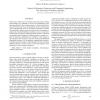29 search results - page 3 / 6 » Detection-based speech recognition with sparse point process... |
ICASSP
2009
IEEE
15 years 8 months ago
2009
IEEE
Training accurate acoustic models typically requires a large amount of transcribed data, which can be expensive to obtain. In this paper, we describe a novel semi-supervised learn...
ICASSP
2009
IEEE
15 years 8 months ago
2009
IEEE
Despite their effectiveness for robust speech processing, missing data techniques are vulnerable to errors in the classification of the input speech signal’s time-frequency poi...
EACL
2006
ACL Anthology
15 years 2 months ago
2006
ACL Anthology
In this paper, we explore statistical language modelling for a speech-enabled MP3 player application by generating a corpus from the interpretation grammar written for the applica...
127
click to vote
CIKM
2008
Springer
15 years 3 months ago
2008
Springer
Tagged data is rapidly becoming more available on the World Wide Web. Web sites which populate tagging services offer a good way for Internet users to share their knowledge. An in...
103
click to vote
ICASSP
2009
IEEE
15 years 8 months ago
2009
IEEE
Model compensation is a standard way of improving the robustness of speech recognition systems to noise. A number of popular schemes are based on vector Taylor series (vts) compen...

